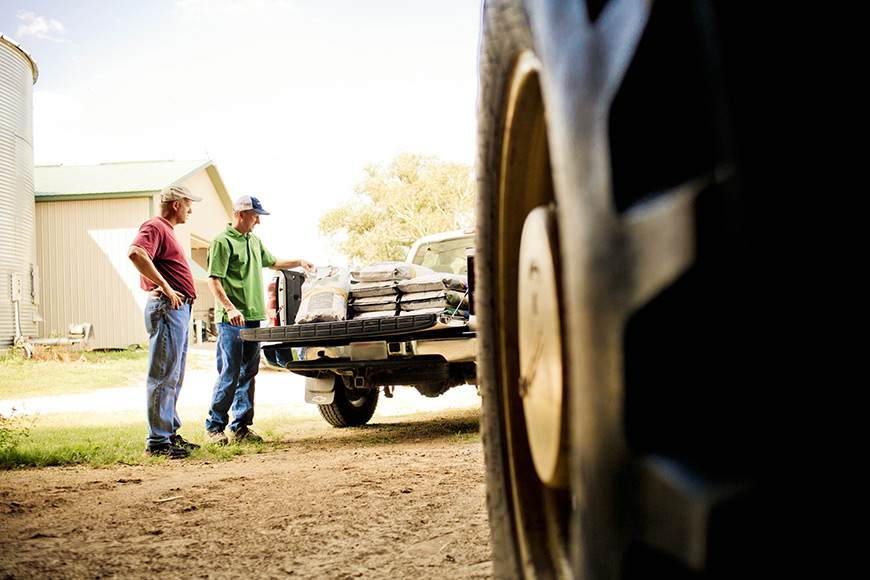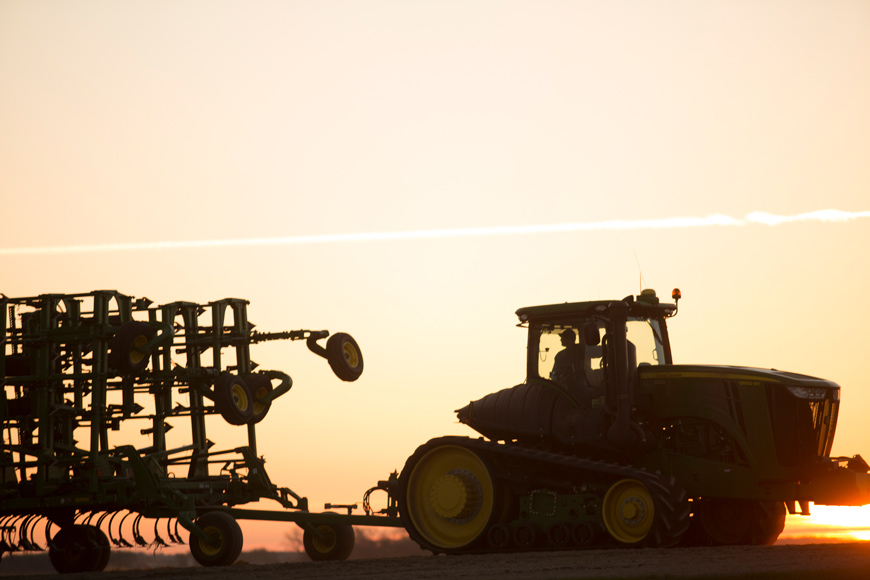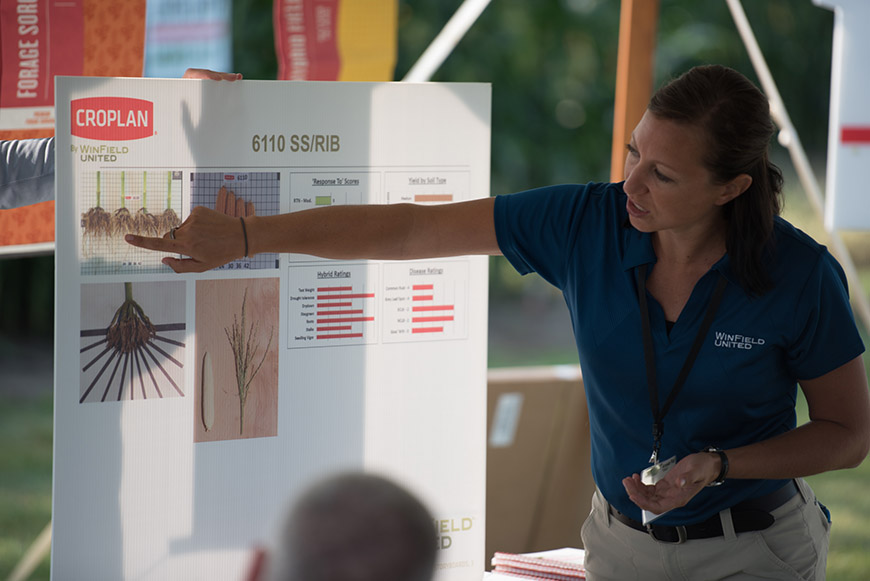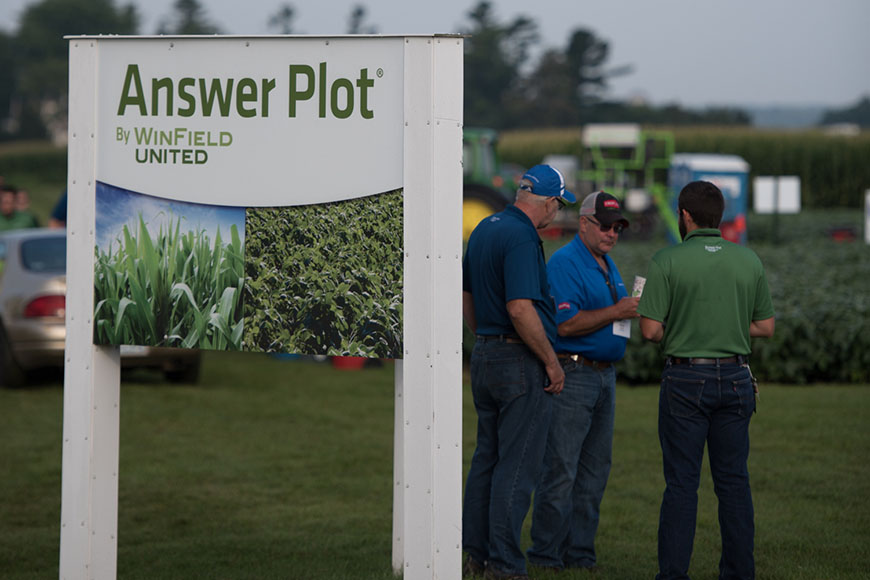5 Tips for Talking With Farmers After a Tough Year
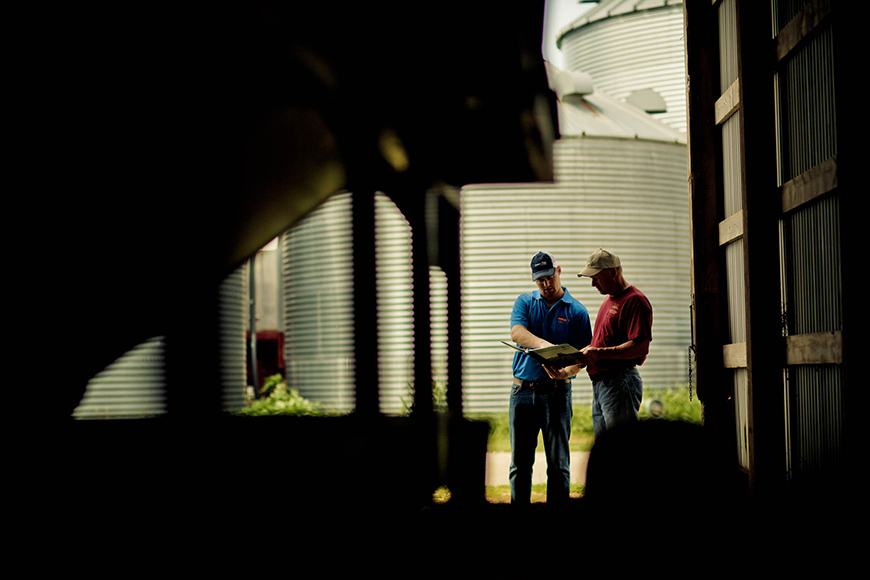
If there’s one piece of advice I’d offer about how to make your year-end meetings with farmers successful, it’s this: Don’t show up empty-handed. After the year we’ve had, it’s vital to bring something of value to your farmers. Think about what that looks like, what you want to say and how you want to say it. And don’t forget to listen.
Here are some tips to help you and your farmers get the most out of year-end meetings after a compressed and stressful growing season.
1. Get in the combine.
Take a ride with farmers when they’re harvesting to talk about the challenges they’ve had this season, their ideas about how to address them and your thoughts on what could be changed for 2020. Winter meetings will probably be delayed this year because of a late harvest. That means you should find out what you can during harvest so you can return for a more fleshed-out discussion when the season is over.
2. Talk about weed management.
Late planting and wet weather were not conducive to applying preemergence herbicides, which led to weed escapes. And weeds running rampant on prevent plant acres in many areas will increase the seed bank for next year. Discuss making changes to weed control programs so weeds don’t become a bigger problem next year. Be sure to make note of the weeds that are present, because that is your seedbank for next year. A fall burndown will be critical to eliminate not only the weeds that are in the field now but also winter annuals. To be further ahead come spring, talk with farmers about the advantages of doing a fall burndown with some residual control.
3. Discuss fertility.
In addition to preemergence herbicides, a lot of nutrients didn’t make it onto fields this year —especially nitrogen. Nitrogen is one of the biggest expenses a farmer has. It will be important to use our response-to-nitrogen information to help farmers get the right rate for the right genetics, making sure they’re optimizing return on investment and yield potential but not overapplying. Farmers need to know how to get their fertility right so they’re not leaving yield in the field next year because of what happened this year.
4. Show up with seed solutions.
Farmers are under financial stress, not only from crop production challenges but from market conditions. Come to your meeting with something that could potentially have a positive financial effect on that farmer. Maybe it’s really focusing on the types of hybrids or varieties that customer should be planting next year to optimize ROI. Maybe it’s reviewing genetic placement with our Characterization Charts (CHT Tool) as well as response-to scores. Maybe it’s selecting a cropping system and inputs that will fit a particular management style or showing some hyperlocal Answer Plot® data.
Don’t concentrate on the poor quality of the 2019 growing season or on price. Instead, be intentional and go in with insights and data from WinField United that are valuable to that particular farmer. We’ll also have up to two years’ worth of specialized data available on certain chemistries that are just hitting the market this fall, so stay tuned for more information on how to leverage that.
5. Use the past as a window to the future.
The R7® Tool and an NDVI map show field variation, enabling you to talk through what happened to a particular crop and why: late planting, wet spring, less solar radiation or whatever it happens to be. Talk with the farmer about what Mother Nature did, how it affected crops and why we are where we are today. Then, use that information to build a plan for 2020.
There’s an old saying about not looking in the rearview mirror when you’re driving down the road, but rather looking ahead. That’s particularly important this year. Let’s learn what we can from 2019 and use those learnings to help make next year better. Let’s focus on innovative products and fresh insights. There are lots of new areas to explore that will help farmers take what they learned this year and use it in a positive way. When you arrive at the farm gate, be prepared to talk about how you and the farmer can work together to make 2020 the best it can be. For more information, talk with your WinField United representative.
All photos are either the property of WinField United or used with permission.
© 2019 WinField United. Important: Before use always read and follow label instructions. Crop performance is dependent on several factors many of which are beyond the control of WinField United, including without limitation, soil type, pest pressures, agronomic practices, and weather conditions. Growers are encouraged to consider data from multiple locations, over multiple years, and be mindful of how such agronomic conditions could impact results. Answer Plot®, R7® and WinField® are trademarks of WinField United.
Here are some tips to help you and your farmers get the most out of year-end meetings after a compressed and stressful growing season.
1. Get in the combine.
Take a ride with farmers when they’re harvesting to talk about the challenges they’ve had this season, their ideas about how to address them and your thoughts on what could be changed for 2020. Winter meetings will probably be delayed this year because of a late harvest. That means you should find out what you can during harvest so you can return for a more fleshed-out discussion when the season is over.
2. Talk about weed management.
Late planting and wet weather were not conducive to applying preemergence herbicides, which led to weed escapes. And weeds running rampant on prevent plant acres in many areas will increase the seed bank for next year. Discuss making changes to weed control programs so weeds don’t become a bigger problem next year. Be sure to make note of the weeds that are present, because that is your seedbank for next year. A fall burndown will be critical to eliminate not only the weeds that are in the field now but also winter annuals. To be further ahead come spring, talk with farmers about the advantages of doing a fall burndown with some residual control.
3. Discuss fertility.
In addition to preemergence herbicides, a lot of nutrients didn’t make it onto fields this year —especially nitrogen. Nitrogen is one of the biggest expenses a farmer has. It will be important to use our response-to-nitrogen information to help farmers get the right rate for the right genetics, making sure they’re optimizing return on investment and yield potential but not overapplying. Farmers need to know how to get their fertility right so they’re not leaving yield in the field next year because of what happened this year.
4. Show up with seed solutions.
Farmers are under financial stress, not only from crop production challenges but from market conditions. Come to your meeting with something that could potentially have a positive financial effect on that farmer. Maybe it’s really focusing on the types of hybrids or varieties that customer should be planting next year to optimize ROI. Maybe it’s reviewing genetic placement with our Characterization Charts (CHT Tool) as well as response-to scores. Maybe it’s selecting a cropping system and inputs that will fit a particular management style or showing some hyperlocal Answer Plot® data.
Don’t concentrate on the poor quality of the 2019 growing season or on price. Instead, be intentional and go in with insights and data from WinField United that are valuable to that particular farmer. We’ll also have up to two years’ worth of specialized data available on certain chemistries that are just hitting the market this fall, so stay tuned for more information on how to leverage that.
5. Use the past as a window to the future.
The R7® Tool and an NDVI map show field variation, enabling you to talk through what happened to a particular crop and why: late planting, wet spring, less solar radiation or whatever it happens to be. Talk with the farmer about what Mother Nature did, how it affected crops and why we are where we are today. Then, use that information to build a plan for 2020.
There’s an old saying about not looking in the rearview mirror when you’re driving down the road, but rather looking ahead. That’s particularly important this year. Let’s learn what we can from 2019 and use those learnings to help make next year better. Let’s focus on innovative products and fresh insights. There are lots of new areas to explore that will help farmers take what they learned this year and use it in a positive way. When you arrive at the farm gate, be prepared to talk about how you and the farmer can work together to make 2020 the best it can be. For more information, talk with your WinField United representative.
All photos are either the property of WinField United or used with permission.
© 2019 WinField United. Important: Before use always read and follow label instructions. Crop performance is dependent on several factors many of which are beyond the control of WinField United, including without limitation, soil type, pest pressures, agronomic practices, and weather conditions. Growers are encouraged to consider data from multiple locations, over multiple years, and be mindful of how such agronomic conditions could impact results. Answer Plot®, R7® and WinField® are trademarks of WinField United.



